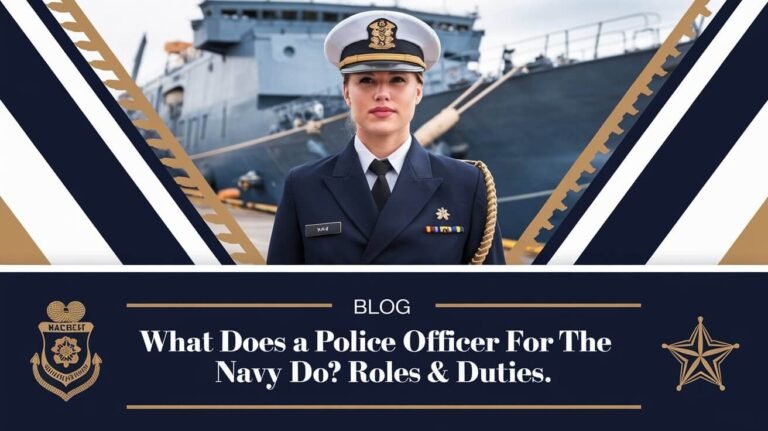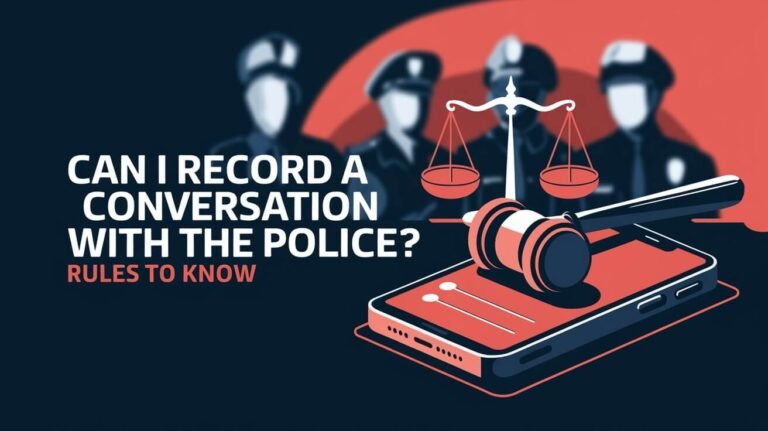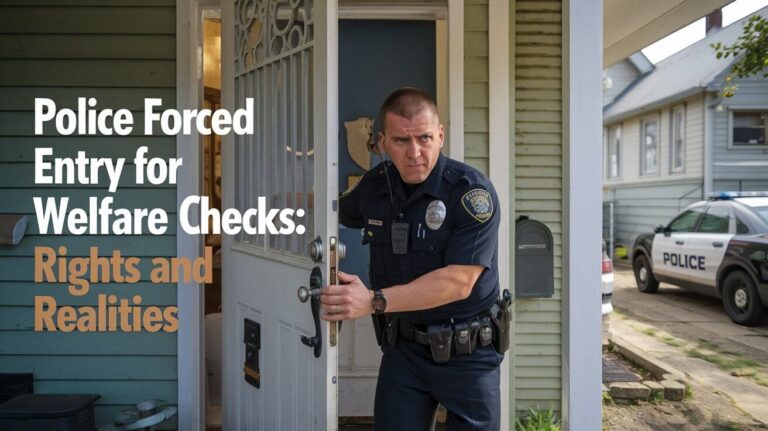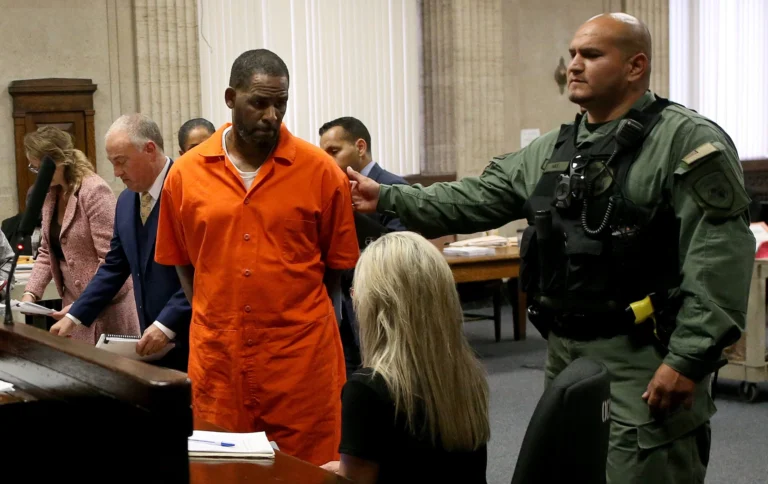Is It Illegal For Police To Deny A Lawyer: Legal Implications
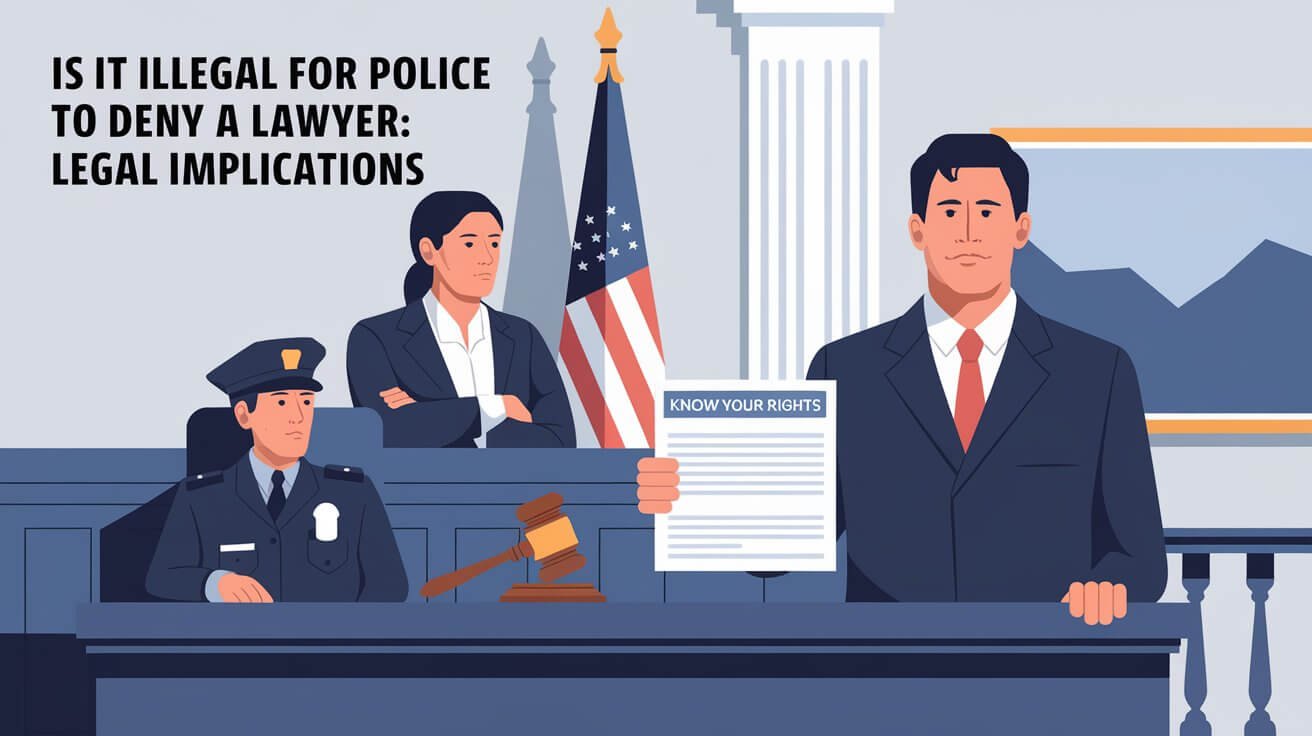
The right to counsel is a key right in the United States. Police denying a lawyer can lead to serious issues. The U.S. Constitution guarantees the right to legal representation in criminal cases.
This right is vital for a fair trial and protecting the accused’s rights. It’s a core part of the U.S. justice system. Denying a lawyer is illegal and can harm the legal process.
In police encounters, people have the right to stay silent and not answer questions. They also have the right to talk to a lawyer before answering any questions. If police deny a lawyer request, it’s illegal.
Knowing your rights is important to avoid legal problems. Understanding the right to counsel and the effects of police denying a lawyer is key. It helps navigate police interactions.
Your Constitutional Right to Legal Representation
The U.S. Supreme Court has made it clear that constitutional rights are key. This includes the right to have a lawyer during certain early steps in legal proceedings. The right to remain silent and the right to an attorney are vital during police questioning.
In the United States, having a lawyer is a basic right. The Sixth Amendment guarantees this right, and the Fifth Amendment protects against being forced to say something that could hurt you. The Supreme Court made the Sixth Amendment apply to all states in 1963. Cases like Gideon v. Wainwright have made this right even stronger.
Miranda Rights Explained
Miranda rights are a big part of constitutional rights. They make sure people know they can stay quiet and have a lawyer during police questions. These rights help keep people safe from unfair police actions and make sure they are treated fairly.
Sixth Amendment Protections
The Sixth Amendment gives people many important rights. This includes the right to a quick and public trial, to know the charges against them, and to face their accusers. Having a lawyer is a big part of these rights. It makes sure people can get legal help at every step of the legal process.
Fifth Amendment Connections
The Fifth Amendment protects you from being forced to say something that could hurt you. This right is closely tied to the right to counsel. It means you can stay silent and talk to a lawyer before answering police questions.
Police Obligations During Arrests
When someone is arrested, the police must follow certain rules. They must tell the suspect about their right to a lawyer. The U.S. Supreme Court has made it clear that the police must do this right.
Some key police duties during arrests include:
- Informing the suspect of their right to remain silent
- Advising the suspect of the consequences of waiving their right to remain silent
- Informing the suspect of their right to an attorney
- Allowing the suspect to contact a responsible person to inform them of the arrest and charges
It’s vital for people to know their rights when arrested. The police must follow the right steps to protect these rights. This means following arrest procedures and respecting the right to counsel. Knowing these rules helps individuals deal with arrests better and protect their rights.
| Right | Description |
|---|---|
| Right to Remain Silent | The suspect has the right to remain silent and not answer questions |
| Right to Counsel | The suspect has the right to an attorney and should be informed of this right |
| Right to Contact a Responsible Person | The suspect has the right to contact a responsible person to inform them of the arrest and charges |
Following proper arrest procedures and respecting the suspect’s rights, the police can ensure that the arrest process is fair and just. Individuals should understand their rights and the police obligations during arrests to navigate the process effectively.
When Police Must Allow Attorney Access
Police must let people talk to their lawyers at different times during arrest and questioning. The right to counsel is a key part of our justice system. It ensures fairness and justice.
The U.S. Supreme Court has made it clear that people must know they can talk to a lawyer before police start asking questions. This means they can get advice before saying anything to the police. At the booking stage, people should also be able to call their lawyer. This helps them get the legal help they need.
Key Situations Requiring Attorney Access
- During police questioning to protect individuals’ rights and prevent coercive tactics
- Before making statements to ensure individuals understand their rights and the legal consequences
- At booking procedures to facilitate access to legal representation and ensure individuals’ rights are respected
Letting people talk to their lawyers, police help protect their rights. This makes the legal process fair and just. If police don’t let people talk to their lawyers, it can lead to big problems. Evidence might not be allowed in court.
| Situation | Attorney Access Requirement |
|---|---|
| Police Questioning | Individuals must be informed of their right to counsel and allowed to consult with an attorney |
| Making Statements | Individuals must be allowed to consult with an attorney before making any statements |
| Booking Procedures | Individuals must be allowed to contact their attorney to ensure access to legal representation |
Is It Illegal For Police To Deny A Lawyer: Legal Facts
Understanding the legal side of police denying a lawyer is key. The U.S. Supreme Court has ruled that denying a lawyer can lead to a conviction being overturned. This shows how vital it is to protect a suspect’s rights.
It’s important to know the legal facts about police denying a lawyer. Such actions by police can lead to serious consequences, like a conviction being overturned. Police must have a good reason to stop or detain someone. Any actions without a valid reason are illegal.
Some key points to consider include:
- Deprivation of a defendant’s right to counsel can result in the reversal of a conviction
- Denial of a choice of attorney without good cause can also lead to the reversal of a conviction
- Police must have a reasonable suspicion to stop or detain an individual
- Illegal actions by police can have severe legal consequences, including the reversal of a conviction
Police denying a lawyer is a serious matter with big legal consequences. It’s vital to understand the legal facts and protect individuals’ rights. This way, we ensure justice is served and those wronged get the compensation they deserve.
| Case | Outcome | Legal Consequences |
|---|---|---|
| Riley v. California | Conviction reversed | Police cannot search the contents of a cell phone without a warrant |
| United States v. Tugwell | Conviction upheld | Abandoned property forfeits privacy protections under the Fourth Amendment |
Time Limits for Attorney Contact
Time limits are key when it comes to getting in touch with an attorney. In urgent cases, the police must let the suspect call their lawyer right away. The U.S. Supreme Court has ruled that defendants have the right to counsel during some early stages of a case.
In regular hours, the police need to let the suspect talk to their lawyer quickly. This depends on the lawyer’s schedule and where the suspect is. On weekends or after hours, the police must also let the suspect call their lawyer, but the time frame might be a bit longer.
Emergency Situations
In emergencies, the time to contact an attorney is very important. The police have to investigate while also giving the suspect time to call their lawyer. The U.S. Supreme Court has said that the police must let the suspect call their lawyer quickly, even in emergencies.
Regular Business Hours
During regular hours, the rules for contacting an attorney are clearer. The police must make sure the suspect can reach their lawyer in a fair amount of time. This time can change based on the situation. Here are some general rules for regular hours:
- The police have 30 days to file charges after an arrest or serving a summons.
- The trial must start within 70 days after the charges are filed or the defendant is seen by a judge, whichever is later.
Weekend Arrests
On weekends or after hours, the rules for contacting an attorney are a bit different. The police must let the suspect call their lawyer, but the time might be longer. It’s important to remember that the right to contact an attorney doesn’t change, no matter when the arrest happens.
Direct Actions When Denied Legal Counsel
When someone is denied legal counsel, it’s key to act fast to protect their rights. The U.S. Supreme Court says a defendant must show the lawyer’s actions were very bad and hurt their case. To fight back, appealing and filing a complaint are important steps. These actions help make sure the police are held responsible.
It’s important to know that police must give access to legal help. If this right is denied, taking action right away is necessary. The Department of Justice looks into and charges police for breaking the law, including denying legal counsel. Here are some steps to take:
- Contacting the Department of Justice to report the incident
- Filing a complaint with the police department’s internal affairs division
- Seeking relief on appeal, if necessary
- Reaching out to organizations such as the Innocence Project of Texas or the Texas Civil Rights Project for assistance
Remember, acting quickly when denied legal counsel is vital to protect your rights. Knowing where to get help and acting fast can help you through the criminal justice system. This way, you can fight for the justice you deserve.
Documentation Requirements for Police
Law enforcement officers must keep detailed records of all interactions. This includes requests for counsel and searches. It’s important to protect individual rights and document any misconduct.
The U.S. Supreme Court says police need a warrant or consent for home searches. This shows how vital police records are in safeguarding rights. Key aspects of police documentation include:
- Recording of requests: Police must record all requests made by individuals, including requests for counsel and searches.
- Official reports: Police must maintain official reports of all interactions with individuals, including arrests, searches, and seizures.
- Body camera evidence: Police must also maintain body camera evidence, which can provide valuable insights into police interactions and help to resolve disputes.
Police records may include details of 3 phone calls within 3 hours of arrest. They also need to accept certain IDs, like the AB 60 license in California.
| Documentation Requirement | Description |
|---|---|
| Recording of requests | Police must record all requests made by individuals, including requests for counsel and searches. |
| Official reports | Police must maintain official reports of all interactions with individuals, including arrests, searches, and seizures. |
| Body camera evidence | Police must also maintain body camera evidence, which can provide valuable insights into police interactions and help to resolve disputes. |
Keeping accurate records, police protect individual rights and address misconduct. This builds trust and upholds justice and fairness.
Legal Consequences for Rights Violations
When police break the law, they face serious consequences. These can include fines, jail time, and disciplinary actions. The U.S. Supreme Court makes sure police are held accountable and suspects are protected.
There are laws like the “Police Misconduct Provision” and Title VI of the Civil Rights Act of 1964. These laws stop police from being discriminatory. The Americans with Disabilities Act (ADA) and Section 504 of the Rehabilitation Act also protect people with disabilities from police bias.
If you think your rights were broken, you can take steps to fight back. You can file a complaint with the police’s internal affairs or a civilian board. Seeking legal help is also a good idea. Important steps include: * Writing down the officers’ badge numbers and car numbers * Getting a lawyer * Filing a complaint with the police or a board * Telling groups like the ACLU about the incident
Holding police accountable is key to protecting our rights. By knowing the legal outcomes of police misconduct and taking action, we can build a fairer society.
| Laws | Purpose |
|---|---|
| Police Misconduct Provision law (34 U.S.C. § 12601) | Addresses police misconduct and provides injunctive relief |
| Title VI of the Civil Rights Act of 1964 | Prohibits discriminatory actions by law enforcement agencies |
| Americans with Disabilities Act (ADA) | Protects individuals from discrimination based on disabilities in law enforcement services |
State-Specific Variations in Legal Access
State laws greatly affect how people get legal help. The U.S. Supreme Court has said people have the right to a lawyer in some early steps. But, what this means can change a lot from state to state. Knowing the local laws is key to getting through the legal system well.
Some states are more relaxed about who can get a lawyer, while others are stricter. For example, some states let people ask for a lawyer sooner than others. Also, how state supreme courts interpret these rights can vary a lot.
Local Law Differences
Local laws can really change how easy it is to get a lawyer. In some places, local rules might add extra protections or limits. It’s important for people to know these local laws to protect their rights.
State Supreme Court Rulings
State supreme court decisions are also very important. They help make clear what rights people have and how to understand state laws. By knowing these decisions, people can better understand their legal rights and get the help they need.
Court Precedents on Attorney Access
The U.S. Supreme Court has ruled that defendants have the right to choose their own lawyer. This is a key part of court rules on lawyer access. Supreme court decisions have shaped how lawyers work in the U.S. Cases like Montejo v. Louisiana have helped change these rules.
Some important supreme court decisions have greatly affected lawyer access. These include:
- Arizona v. Roberson, which set rules for when someone can give up their Sixth Amendment rights.
- Crooker v. California and Cicenia v. Lagay, which were five-to-four decisions that showed the complexity of lawyer access rules.
- Michigan v. Tucker, where Justices Blackmun, White, and Rehnquist disagreed, showing the ongoing debate on lawyer access.
These court precedents and supreme court decisions have helped shape the rights of attorney access. By looking at these cases, we can understand the rules that guide lawyer access in the U.S.
| Case | Year | Decision |
|---|---|---|
| Montejo v. Louisiana | 2009 | Overruled Michigan v. Jackson |
| Arizona v. Roberson | 1988 | Established guidelines for waiver of Sixth Amendment rights |
| Crooker v. California | 1958 | Involved a five-to-four decision |
Rights During Different Types of Detention
Understanding your rights during detention is key. The U.S. Supreme Court has made it clear that police must respect your rights. This includes the right to have a lawyer. Police need a good reason to stop you during street investigations.
Here are some important rights to know about during detention:
- You have the right to talk to a lawyer and your family within a certain time.
- Every police station must post a sign about your right to make free phone calls.
- Police must keep records of your phone calls, including when and why you didn’t make any.
Knowing these rights helps protect you during detention. It ensures police follow their duties and respect your rights. By understanding your rights, you can handle the situation better and make smart choices.
Endnote
The right to counsel is a key right that must be protected. The police must respect and uphold this right to counsel. This ensures suspects get legal help during important parts of the legal process.
Even though rules can differ in different jurisdictions, the main idea stays the same. The right to counsel is a vital part of the justice system. It must be kept safe.
Suspects need to know their rights and act to use them. The police must follow legal precedents and give legal help on time. By working together, we can keep the justice system fair for everyone.
Common Concerns
What is the right to counsel and why is it important?
The right to counsel is key in the U.S. justice system. It ensures a fair trial and protects the accused’s rights. The Sixth Amendment guarantees the right to counsel in all criminal cases.
What are the Miranda rights and how do they relate to the right to counsel?
The Miranda rights protect the accused during police interrogations. They include the right to remain silent and the right to an attorney. These rights are tied to the Sixth Amendment’s right to counsel and the Fifth Amendment’s protection against self-incrimination.
What are the police’s obligations when it comes to the right to counsel during an arrest?
Police must inform suspects of their right to counsel. They must ensure the suspect understands this right. The police also need to allow the suspect to contact their attorney and ensure the attorney is present during questioning.
In what specific situations must the police allow the suspect to access their attorney?
Police must allow access to an attorney during questioning and before making statements. They also need to allow access during booking procedures. The U.S. Supreme Court has set these rules to protect the suspect’s right to counsel.
What are the legal consequences if the police deny the suspect’s right to counsel?
Denying a lawyer can lead to a conviction being overturned. The U.S. Supreme Court has made it clear that the police must respect the suspect’s right to counsel. Any violations can have serious legal consequences.
How do the time limits for attorney contact work, and what happens in emergency situations?
Police must give suspects time to contact their attorney, even in emergencies. The U.S. Supreme Court has set guidelines for these time limits. This ensures the suspect’s right to counsel is protected.
What should I do if the police deny me access to my lawyer?
If police deny you access to your lawyer, act quickly to protect your rights. This may involve seeking relief on appeal or filing a complaint. The U.S. Supreme Court has provided guidance on these steps.
What documentation requirements do the police have when it comes to the right to counsel?
Police must keep accurate records of interactions with suspects, including requests for counsel and searches. This documentation, like official reports and body camera evidence, is key to protecting the suspect’s rights.
How do the legal consequences for rights violations vary across different states?
Laws and regulations on the right to counsel vary by state, as do legal consequences for violations. Suspects need to know the state-specific rules and precedents that affect their right to an attorney.
What are some of the key court precedents related to the right to counsel?
The U.S. Supreme Court has set many important precedents on the right to counsel. These include the right to counsel of one’s choice and the police’s obligation to respect this right. Suspects should be familiar with these case law developments.
How do the rights to counsel differ depending on the type of detention?
The rights and obligations related to the right to counsel vary by detention type, like a traffic stop versus a full-blown arrest. Suspects need to understand how their rights differ in different scenarios.


